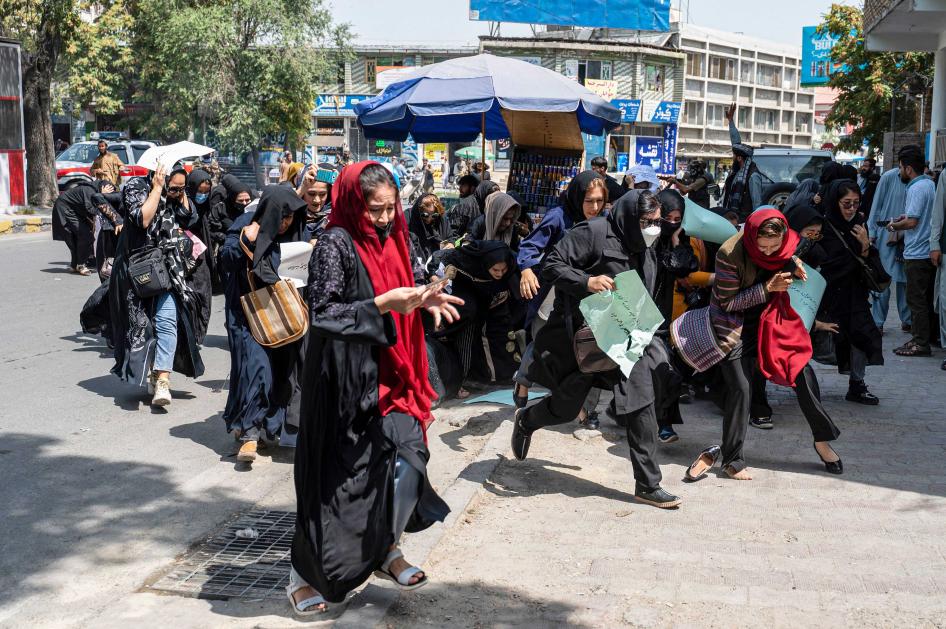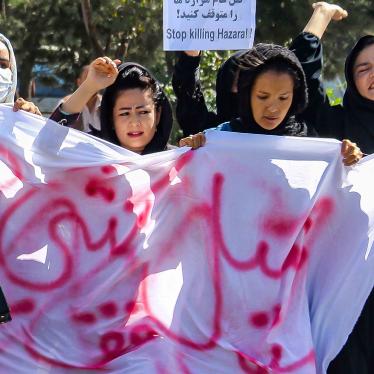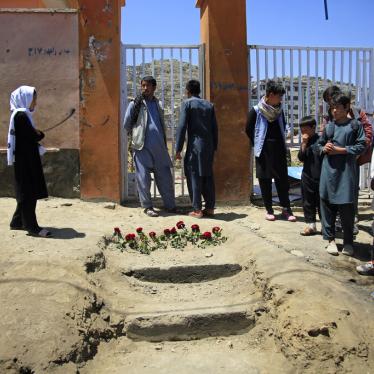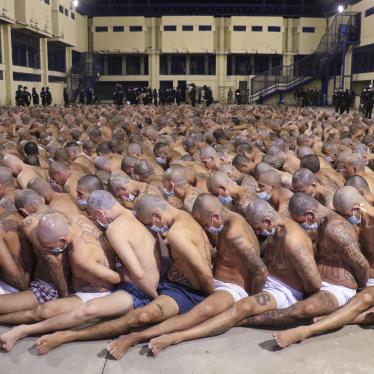(New York) – Three Afghan women detained for protesting Taliban abuses described torture and other severe mistreatment in custody, Human Rights Watch said today.
The women said they were wrongfully detained with their families, including small children. They experienced threats, beatings, dangerous conditions of confinement, denial of due process, abusive conditions of release, and other abuses. The authorities assaulted and administered electric shocks to detained male relatives. The women’s description of their experiences sheds light on the Taliban’s treatment of women protesters in custody and the Taliban’s efforts to silence the protest movement.
“It’s difficult to overstate the incredible bravery of these and other Afghan women who protest against Taliban abuses,” said Heather Barr, associate women’s rights director at Human Rights Watch. “These women’s stories show how deeply threatened the Taliban feel by their activities, and the brutal lengths the Taliban go to try to silence them.”
The Taliban had arbitrarily arrested the three women during a single raid on a safe house in Kabul in February 2022. The Taliban authorities held them and their family members for several weeks at the Interior Ministry in apparent retaliation for their involvement in planning and participating in women’s rights protests. After their release, they were able to flee the country.
After the Taliban seized control of Afghanistan on August 15, 2021, they immediately began rolling back the rights of women and girls. Women began to protest on the streets since Taliban’s first week in power, despite the grave risks they faced in doing so. By early September, women-led protests were taking place in Herat province in western Afghanistan and quickly spread across multiple provinces.
The Taliban response was brutal from the beginning, beating protesters, disrupting protests, and detaining and torturing journalists covering the demonstrations. The Taliban also banned unauthorized protests. Over time, the Taliban’s abusive responses escalated, with a particularly brutal response to a protest on January 16 in Kabul, when Taliban members threatened, intimidated, and physically assaulted protesters, using pepper spray and electric shock devices.
Days later, the Taliban began conducting raids to arbitrarily detain women who had participated in protests. The Washington Post documented the Taliban’s arrests of 24 women’s rights activists, some taken with their families, in January and February.
Tamana Paryani, one of the first protesters to be arbitrarily detained under Taliban rule, filmed herself as the Taliban broke into her home at night searching for her, and then quickly posted the video on social media. The women interviewed said that Paryani’s abduction sent waves of fear through other protesters, causing many to go into hiding.
“I didn’t know them well, but I became afraid then,” one woman said, referring to Paryani and another woman arrested that night. “I woke up at night and all my body shook.… We were so afraid. We knew we would be arrested.” Another woman said family and friends repeatedly urged her to flee the country, but she refused: “I wanted to stay and fight.”
The three women described being held initially in a single cramped and stiflingly hot room with a total of 21 women and 7 children for five days, provided virtually no food or water or access to a toilet. The Taliban held them for several weeks, and abusively interrogated them, without allowing access to counsel or other due process rights, forcibly coerced confessions, and severely tortured the men.
The Taliban compelled the three women’s families to hand over the original deeds to their property as the price for release, with the threat that the Taliban would confiscate the property if the women got into trouble again.
The Taliban should immediately release everyone detained for exercising their rights to free speech and peaceful protest. They should respect the rights of all to peaceful assembly and free expression, including journalists covering protests. They should end all arbitrary detention, ensure due process, including promptly charging suspects in custody before an independent judge, and providing immediate access to counsel.
The Taliban should hold lawfully detained individuals in accordance with the UN Standard Minimum Rules for the Treatment of Prisoners. Anyone responsible for torture or other ill-treatment should be impartially investigated and appropriately prosecuted.
Governments engaging with the Taliban should press them to comply with Afghanistan’s obligations under international law including to respect freedom of speech and assembly, to ensure due process, and to prevent torture and other ill-treatment. They should increase refugee resettlement places for Afghans and give priority to resettling women’s rights defenders who are at particular risk because of ongoing activism.
The governments should also establish and maintain generous complementary pathways for safe, legal, and orderly migration. The UN and concerned governments should advance efforts to provide accountability for human rights violations in Afghanistan, including attacks on women’s rights protesters, through steps such as establishing a new UN-mandated accountability mechanism to investigate and collect evidence of abuses.
“Afghan women and girls have faced some of the harshest consequences of Taliban rule, and they have led the difficult fight to protect rights in Afghanistan,” Barr said. “Unfortunately, their pleas to the international community to stand by them have not been answered.”
Women Protesters’ Accounts
In the days following the protests in February, the Taliban began arresting protesters. The three women protesters interviewed said they expected to be arrested. Khorshid (all names are pseudonyms), said a male relative saw Taliban members on the street outside their home. “Dinner was ready,” she said, but he said, “We have to go now: they are here to arrest you.” The two, with Khorshid’s young children, left through the back of the house to temporary safety with family members. “On the way, there were a lot of checkpoints,” Khorshid said. “I said I was pregnant and needed a doctor. The Taliban searched my face with a torch at every checkpoint.”
A day later, Khorshid’s family learned that the Taliban had that address. Khorshid said the family members sheltering them ordered them out of the house. The family fled into the cold. Khorshid said she feared most for her children’s safety and pleaded, “Take the children far away from me; just leave me alone.” The family managed to make their way to a location used as a safe house.
The three women said that on a night in February, they heard Taliban members pound loudly on the front door of the apartment building where they and other protesters were hiding with their families. Khorshid said she saw women running up the stairs and Taliban members running after them. She put food in front of her children in hopes that this domestic scene would reduce the Taliban members’ aggressive behavior: “I told my kids, ‘Don’t be afraid. Be strong. You’re not just a kid: you’re my kids.’ I knew they would arrest us, but I didn’t think they would arrest my kids.” But the entire family was arrested, including the children.
One woman was in the shower when the Taliban came; they threatened to break down the door if she did not come out immediately. Another family did not open their door. The Taliban broke it down.
The Taliban team who raided the safe house included five women. “The women had their faces covered and had guns,” said Hypatia, another of the protesters interviewed. “They demanded: ‘Raise your hands, give us your phone, tell us your name. When I didn’t give her my phone, she called a big Talib … He asked my name then he said, ‘[Hypatia] is one of the protesting women. Six months she is protesting against us. She put us in a bad situation: it is good that we are arresting her.’” Hypatia still refused to hand over her phone and the male Taliban member hit her with a radio. She finally handed over the phone and said that in that moment she was so afraid that she urinated on herself.
Khorshid described being held across the room from her children, and a female member of the Taliban team holding a gun to her head and demanding her phone: “I said, ‘Don’t put your gun on my kids.’ My kids were in shock, shaking. I said, ‘Let me hug my kids.’ They wouldn’t let me.” Khorshid was then taken to be interrogated by male Taliban members. She said:
One Taliban put a gun to my head. He asked, “Who are you and why are you here?” I was crying, but I felt strong because one of my wishes was to be face-to-face with them. I said, “I am afraid of God, not you. I will say everything truthfully.” I said, “I am a protester.” I had no choice. They know me: my phone was in their hand.
Khorshid said the Taliban badly beat her male relative in a room adjacent to where she and her children were being held. “Everyone heard, especially my kids. They thought they will kill him. They kicked him too much.”
Oqyanoos, the third protester interviewed, said the Taliban also severely beat her male relative in the safe house, while the women were held in an adjoining room: “When they put us in the room, they started torturing our men. We all heard them crying. It was a really bad situation; there was nothing we could do.”
While the men were being beaten, the women prayed. “One of our friends said, ‘Pray for God,’” Khorshid said. “She had a Quran. All the women and kids got on our knees and prayed.…We prayed for God to keep us safe. At that time, we wanted to die. Some wanted to jump from the windows or kill themselves. We didn’t want to be alive.” Hypatia said she prevented a fellow protester from throwing herself from the window.
That night, the Taliban drove the protesters and their family members to the Interior Ministry headquarters in several pickup trucks.
“They drove very fast,” said Hypatia. She said a Taliban member who had physically assaulted people in the house continued kicking and hitting people in the truck during the journey, including hitting them with his gun and his radio. Hypatia’s two male relatives, who were taken into custody with her, were blindfolded with their hands tied while being transported in the back of a truck.
When they arrived at the ministry, “one important Talib was waiting for us,” Hypatia said. “He started shouting: ‘You put us in a bad situation. Because of you the world did not recognize us. Where were you in the last 20 years when the US killed us and our wives? You didn’t raise your voice. Now for five months you are complaining about us.’ We were all afraid.”
The women and children were held in a small room at the ministry that appeared to be a nursery for children of staff members. The women said there were 21 women and 7 children confined together in a stiflingly hot room with no ventilation for five days and virtually no food or water. “There was a small window, but we couldn’t open it. There was no AC,” Hypatia said. “The oxygen ended in the room. The kids couldn’t sleep. We were like fish out of water.”
“All of us were in one room.…There was no space to sit,” Khorshid said. “We were all sitting scrunched up.…We tried to find a place for the kids to sleep.” They were given very little food: four kebabs the first night for the whole group.
The women said that for several days the only food they received was very old bread. “I gave it to my kids, just for them to be alive,” Khorshid said. “My kids were thirsty: there was no water. There was a dish where the women Taliban washed their dishes. I used this water for my kids to drink. They were crying because it was so dirty.”
“They cut the water in the washroom,” Khorshid said, adding that they were rarely allowed to use it. “One guard said, ‘Pee in the room.’ The kids peed on their clothes a lot. They had no other clothes.”
Oqyanoos, Khorshid, and Hypatia said that all the women who were detained with them were interrogated individually for two to three hours. The first full night they were held at the ministry, and the interrogations continued all night and into the morning, from 7 or 8 p.m. to 11 a.m. “For five days it was just asking questions,” Hypatia said. The Taliban had seized the phones of all the women being interrogated, as well as some laptops.
“They searched our Facebook, searched our calls, searched all of that: all of our documents on our laptops,” Hypatia said. “They played our messages to us and asked about them. They asked, ‘Where are your other friends?’ They said, ‘You must help us find them.’”
The three women and the men experienced torture and other ill-treatment, in violation of international law. They said the guards sometimes hit the women and spoke abusively to them. “They said, ‘You are working for Western countries. You are bitches, selling your bodies to many men,’” Khorshid said, adding that the guards taunted her, saying that her husband hadn’t fathered her children. One female guard forced them to repeat the Quran after her all night long, compelling them to pray. Khorshid and Hypatia both said that guards had hit them with their guns or radios.
The interrogators accused one of the detained women of being in league with the National Resistance Front, an opposition armed group, and threatened to keep her in custody until she died. The interrogators ordered the women to provide written statements, detailing their activities and supporters.
Hypatia became ill. “On day six, all the kids were sick: they couldn’t move,” Khorshid said, adding that the Taliban then brought a doctor. “The doctor said, ‘You don’t give them food or water, and there is no oxygen: they will all die. You must take them to a hospital.” A senior male Taliban official came and ordered guards to give them another room, providing them with more space, food, water, and some needed medications.
The men were held separately, and the women had no contact with them. “For 15 days I was asking to see my husband,” Hypatia said. “They refused.” They said they later learned that the men continued to be subjected to more extreme physical violence than the women, including electric shock and assault by multiple Taliban members, with the men being held in restraints and battered and taunted with sexual insults about their female relatives. They had extensive injuries from this abuse. Khorshid said that when her male relative was released, he had permanent scarring from his injuries.
While in custody, the women and their families were forcibly disappeared, Human Rights Watch found. The women said that neither they nor any of the people they were held with were permitted to contact their families. They feared for their families’ safety, worrying that other family members might also be targeted. Their relatives later told them that their families searched for them, asking police for help, but the police said they were unaware of the detainees’ whereabouts. None of the three women, the family members detained with them, or the others they were held with were taken to court, charged with any crime, or permitted access to a lawyer.
The Taliban compiled and released on social media a heavily edited video of the protesters “confessing” that they had been influenced by members of the Afghan diaspora and suggesting that they had protested only to obtain asylum abroad, not out of genuine grievance. Hypatia said a female jailer told her: “The Taliban want to take video, not for the public, only for their archive. You must say that you were not working for human rights; only to be evacuated and because some people were telling you to.” The Taliban knew from their phones whom they had been in touch with, including supporters outside the country, and demanded that the women name some of these people on video.
The three women said the filming involved many takes. “They coached us between takes. There was a Talib with a gun behind us. They edited it,” Khorshid said. The activists halted public protests for several months after the arrests in January and February, but intermittently resumed, including ahead of the August 2022 anniversary of the Taliban takeover.
The three women said they and their family members were held for several weeks. They said some women who were taken into custody with them were freed earlier because they were not protesters: they were just trying to flee the country. “They kept us. They said we would be prosecuted as a political case. We didn’t think we would be freed. I cried too much. I begged them to let my kids out,” Khorshid said.
Before releasing Oqyanoos, Khorshid, and Hypatia, the Taliban contacted their families. They summoned the women’s family members, forcing them to bring the original deeds for any property the families owned. Hypatia said:
We were released by making a promise: “After this day we don’t do anything against the Taliban.” We signed, and our families also signed, and our deeds for our houses are with the Taliban. My father and brother’s house is with the Taliban. All of us are the same. Our families said, “We won’t let them go out [of the house, for example to plan or attend a protest].” The Taliban said, “When we want you to, you have to bring the women [to our office]. They can’t leave the country.”
“The Taliban took our originals [of the deeds],” Khorshid said. “They said, ‘When we see you do anything, we will take your houses for ourselves.’” The three women said that the other protesters arbitrarily detained with them received the same treatment.
After their release, the three women participated with others in a protest that they filmed and posted on social media. The Taliban then arrested Oqyanoos’s brother, and held him for several hours, kicking him while demanding to know her whereabouts. “[Our families] are really in danger,” Hypatia said. “But we can’t stop. Maybe some countries will recognize the Taliban. Some countries don’t know that the Taliban are lying. They just want to fight for power. I am fighting for my life.”
Oqyanoos, Khorshid, and Hypatia have all fled Afghanistan and are trying to reach a country where they can live safely. “Our mental health is not good because our sisters and daughters are still there,” Hypatia said. “A girl from my village killed herself. There is no media to cover what is happening.… One of my relatives with eight kids has disappeared. His wife can’t feed the kids. There is no information about the north. No one knows what is happening there.… We don’t know why the world left us like this.”









